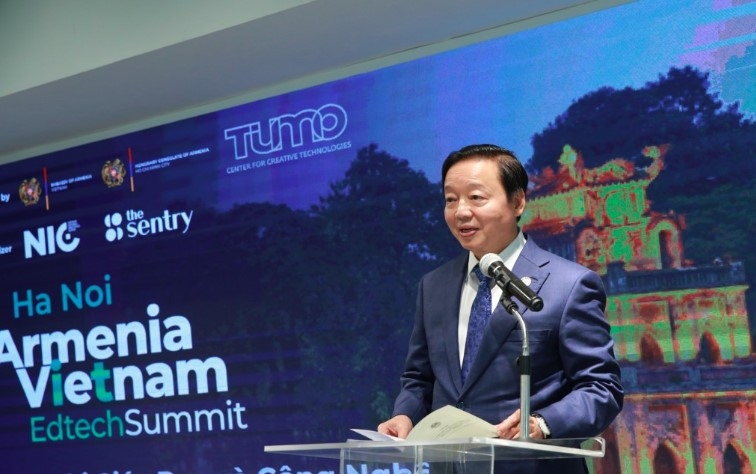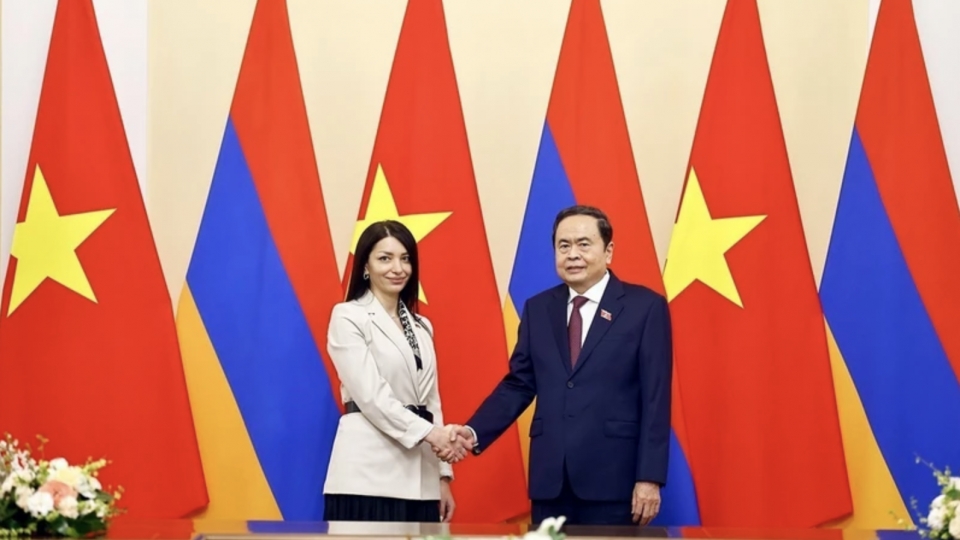Armenia, Vietnam boost cooperation in education and technology
VOV.VN - Deputy Prime Minister Tran Hong Ha has highlighted the long-standing friendship between Vietnam and Armenia, urging stronger cooperation in education and technology at the Armenia-Vietnam Edtech Summit.

The event was co-organized on September 23 by the National Innovation Center, the Embassy of Armenia in Vietnam, the TUMO Center for Creative Technologies, and The Sentry.
The conference is designed to enhance co-operation in strategic areas such as education, technology, and innovation; develop high-quality human resources through knowledge sharing and creative initiatives; and build a sustainable joint ecosystem between the two countries.
It also creates conditions for sharing knowledge, experience, and best practices, thereby opening up possibilities for academic exchanges, joint training programs, and transnational technology projects.
Armenian Ambassador to Vietnam Suren Bagdasaryan said bilateral relations had grown stronger over the past decade through high-level visits and parliamentary exchanges. Referring to National Assembly Chairman Tran Thanh Man’s April 2025 trip to Armenia, he highlighted the role of TUMO, headquartered in Yerevan, which provides technology and AI education for students aged 12-18.
Thousands of young people worldwide have benefited from TUMO’s model, he said, noting that its expansion to Vietnam would mark a new milestone and symbolize the close friendship between the two nations.
In his speech, Deputy Prime Minister Tran Hong Ha affirmed the long-standing traditional bond between Vietnam and Armenia, founded by President Ho Chi Minh and nurtured by the profound sentiments of two nations with heroic struggles, rich traditions of creativity, and aspirations for development.
He pointed out that Armenia, once reliant on natural resources, had quickly transformed into a knowledge-based economy driven by technology, innovation, green growth, and digitalization, an experience valuable for Vietnam in its new development stage.
Vietnam, he stressed, has the political foundations to develop based on science, technology, and innovation, with knowledge and human resources as its new assets.
He applauded the cooperation proposals raised at the event and urged swift implementation to avoid delays, particularly in shaping effective mechanisms for joint work in education, technology, and innovation.
The TUMO model has grown to more than 20 centers worldwide, and Vietnam is expected to become a key destination. Ha called it “a step toward localizing and regionalizing modern educational methods, gradually replacing outdated approaches.”
“Education will be the pioneer in innovation, laying the foundation for a digital government, digital economy, digital society and ultimately a digital world,” he said. He expressed hope that TUMO would create new spaces for Vietnamese students and youth to connect research with practice, equipping them with strong skills and knowledge for future careers.
For such models to succeed, he added, close coordination between government, enterprises, and universities is essential. He urged international partners to help Vietnam shape public–private cooperation policies, clarify the state’s role, and establish financial and legal frameworks for sustainability.
Additionally, innovation centers, universities, and businesses also need to contribute to training human resources in high-tech sectors from semiconductors and digital technology to defence industry and space , Ha said.
Earlier the same day, the Deputy PM met Ambassador Bagdasaryan and praised Armenia’s commitment to bringing the TUMO concept directly to Vietnam. He emphasized that the greatest challenge lies not in infrastructure or funding, which can be mobilized from state and private sources, but in knowledge itself, the most valuable asset of those who designed the model.
Vietnam, he noted, can attract private-sector investment in education. Once TUMO proves effective, it should be expanded quickly through flexible models such as “TUMO boxes” or “TUMO containers” to bring knowledge to remote areas, he said.





